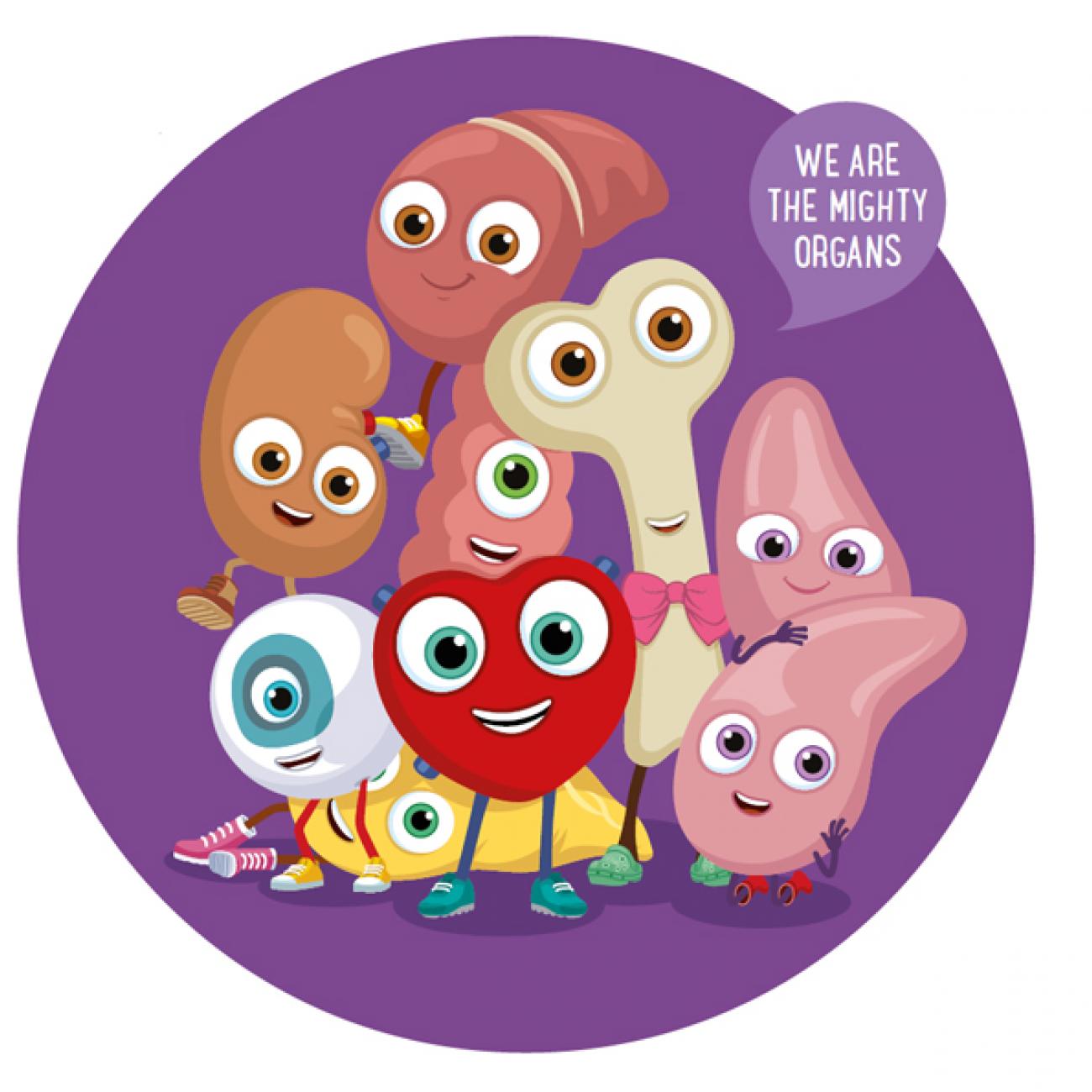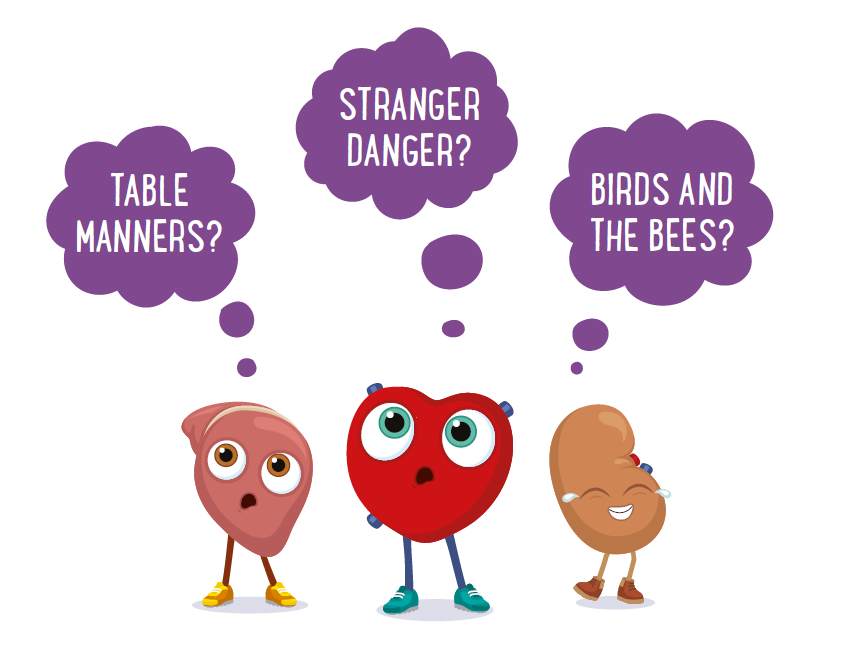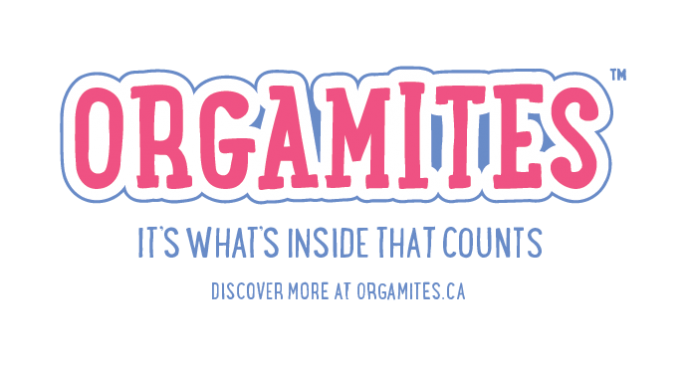
How to talk about organ donation with kids
How to talk about organ donation with kids
Let's Talk!
This family resource booklet from Orgamites Teacher toolkit #1 provides dos and don'ts for how to have a kitchen-table talk at home about the powerful impact of organ donation and why it's so important.

"I've always found it hard to talk about certain subjects with my kids, especially those related to death and organ donation. It's not an easy topic to broach, but it's a conversation that is so important to have. I struggled to find the right way to approach the subject until I discovered Orgamites. With their help, I was able to have an open and honest conversation with my kids about the importance of organ donation and how it can save lives.”
- Glynn Gibb , dad of two kids
Stranger danger, table manners, the birds and the bees... there are so many potentially tricky talks we’re told to have with our kids, but one of the most important ones is often left at the very bottom of the list, or worse – never brought up at all!
Why do we need to talk about organ donation and death?
Far from being a mood killer – here’s why these conversations save lives (literally).
- Unlike so many of the other ‘tricky’ topics, death is a certainty. If we don’t have these tough conversations, we leave our kids (and ourselves) less equipped to deal with death when (not if) it strikes.
- Thankfully, for most families, parents will pass away long before their children. However, none of us can know this for certain. If the worst was to happen, and either we (as parents) pass away unexpectedly, or our children do, talking together long beforehand about our thoughts and choices regarding organ donation and death significantly reduces the stress and grief experienced by those left behind.
- Families who do have these conversations report them being a source of great comfort. What’s more, families who go on to donate their loved one’s organs often find this to be an additional source of consolation. In the midst of tragedy and loss, knowing that other lives have been saved thanks to organ donation, provides one ray of hope in an otherwise dark time.
Need a little help kicking off the convo? No problem, we’re way ahead of you...

HOW TO TALK ABOUT IT...
- As with every important topic, don’t aim to have one big, heavy conversation but many smaller, lighter ones instead. The aim is not to ‘fire hose’ your kids with information, but rather drip-feed a little at a time, in keeping with what they are able to hear and absorb. Think of the first conversation as the first step in a long and winding journey.
- Try to keep it upbeat! Children are often surprisingly unsentimental and accepting of the concept of life and death (especially if you, as their parent, are too). From the age of around 5 to 7, most kids have thought about the reality of death – perhaps their pet fish has died, or a grandparent, or they’ve wept for a movie character. Make sure they’re processing this dawning realisation of life’s fragility and finiteness in the healthiest way possible. Provide honest answers to their questions that can be built on over time, and give them lots of opportunities to express their feelings.
- Let them share their thoughts, fears, and questions. Really listen. It’s okay not to have all the answers, but just make sure you validate their feelings (whatever they may be). This goes for all big parent-kid conversations – the less negative or dramatic our reaction, the more honestly they’ll share with us in the future.
WHAT TO TALK ABOUT
- Talk about the fact that life as we know it is precious, precisely because it isn’t never-ending. None of us know what tomorrow may bring and that’s why we should be grateful for every new day and the opportunities it brings with it for us to love and be loved.
- Let your kids know that you are okay with this reality - it’s part of what makes you be more present - and treasure every single day.
- One day, when you (as their parent) pass on (hopefully in a very, very long time from now), what do you want them to remember most about you? Talk about this with them. Perhaps you also would like to share what you believe will happen when we die – depending on your religious or spiritual beliefs.
- When our lives do eventually end, let them know about the various choices available – regarding organ donation and our remains.
- Perhaps this would be a good time to let them know what you have decided in both cases, and ask them if they have any questions or choices of their own.
Download the family resource booklet
Children under 4:
Children under 4 are probably too young to grasp any complex issues about their internal bodies and organs. But they are certainly interested in what’s on the outside of their bodies and pointing these things out is a good basis to build on for later conversations about what’s on the inside.
Point out your ears, tummy, fingers and toes, with simple explanations about what they do.
Children 4-6:
Start talking about what’s on the inside of our bodies: the different organs and what makes our bodies tick. You could say, for example, “Here is your heart beating, can you feel it going boom boom?” or “Here is your tummy where the food goes” and “Here are your lungs that breathe and take in oxygen from the air”.
Take the lead from your child and don’t worry if they really don’t seem interested in this - all children develop at different rates, and not all will be ready to take it in. You can also start to talk to them about what foods and exercise strengthen which body parts.
Children 6-8:
Perhaps begin talking to your kids about how people get ill sometimes and different organs might not be working properly. Use the Orgamites as a way of introducing the subject in a friendly and positive way, focusing on how each organ can be replaced so people that have been ill or in an accident can go on to live long and happy lives with their new organs.
Remember, children this age are very smart and really take in facts you are telling them. They have memories like elephants. Be sure to prepare what you are going to say to them, as they are likely to question you on it again later!
Children 9+:
At this age, children can begin to understand proper explanations and will realize that people can get sick and die. You should always stress that this is very unlikely in children - that most live a very long life, but that just occasionally a child can be ill or in an accident.
Talk about your own feelings about death, and what your choices are regarding organ donation. You can also watch case studies on the Orgamites.com website, or point out news stories where a child had their life saved as a result of receiving a donor organ.
Do:
- Be age appropriate
- Think multiple chats, not one big heavy conversation
- Teach through play
- Look at picture books together
- Use the Orgamites to help keep it fun
- Focus on the positive messages of survival and healing thanks to organ donation
- Let your child lead you in the conversation and ask as many, or as few, questions as he or she needs
- Be confident and positive; your child will react to your emotions
- Be sensitive to any child that is uninterested or seems to be getting upset
Don’t:
- Don’t rush straight into it, with anyone of any age
- Don’t force a child to listen
- Don’t focus on what it means to be a donor; concentrate instead on what it means to be a recipient
Common reactions:
Totally not fazed: A lot of kids are surprisingly unsentimental and will move on from these chats fairly quickly.
Quiet: It’s also normal for kids to not say much at all as they process the information they’ve just heard. They’re probably okay, but it’s worth checking in with them a bit later to see if they have any questions or concerns.
Upset: In this case, stop the conversation, reassure your child, and change the subject. Come back to it when they’re ready.
If your child is positively receptive, consider making the ‘Mighty Pledge’ together You could even stick it on your fridge, their bedroom door, or frame it for their wall!
Download the Mighty Pledge
FREQUENTLY ASKED QUESTION
Should we really talk to kids about organ donation?
The majority of school-going children appreciate being made aware of organ donation and transplants, and yet the majority of teachers, parents and healthcare professionals feel that they lack the necessary information and resources to broach the subject. In every country in which the Orgamites educational tools
and resources have so far been implemented, the feedback has been consistently positive. This kind of multi-pronged, long-term approach is critical to slowly but surely increase the amount of organs donated, decreasing the long waiting lists, adding to the number of lives saved, and ultimately making organ donation the accepted norm.
The Orgamites programme is brought to you by All Good Co. in partnership with Canadian Blood Services. Our mighty thanks go to all teachers, parents and healthcare professionals for taking part in this programme.
Created by Roydon Turner. ©Copyright, Creative and Production by *Awesonova. All rights reserved. Discover more at Orgamites.ca or Orgamites.com


